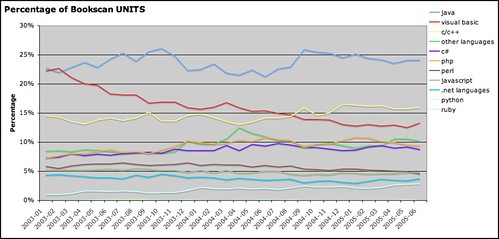Last year at OScon, I gave a presentation entitled What Book Sales Tell Us About the State of the Tech Industry. One of the conclusions I drew was that Java was in decline, as its share of total programming language book sales had dropped by five percentage points in the twelve months ending June 2004. Well, we just re-ran those numbers, and saw a startling reversal.
Here's the updated trend graph showing programming language market share as reflected by weekly book sales reported by Nielsen Bookscan from January 2003 to mid-June 2005:
Note: “.Net languages” includes books that cover any of the .Net supported languages (C/C++, C# and Visual Basic). “Other languages” includes ActionScript, shell scripting, and Lisp. Note also that percentages in this graph do not equal those in the 2004 graph, because that graph did not include JavaScript, ActionScript, or shell scripting (other languages), while this one does. A larger version of the graph can be found here.
You can see that there was a sharp uptick in Java book sales starting in July of 2004 — Java’s share of all programming books sold is up about 3% since June of ’04. A lot of this growth spurt occurred shortly after JavaOne and the new Tiger release, which happened around that time. All of the top titles were revised, and saw a healthy sales increase as a result. However, when we analyzed new books (versus revisions), it appears that a substantial portion of Java’s sustained growth, outside of the classic titles, has come from books on Open Source Java projects, such as Spring, Struts, Lucene, and AspectJ, which collectively performed at nearly double the unit and revenue volumes of new books on their non-Open Source counterparts.
These results indicate that a lot is happening in the Open Source Java community, at least on the book side. To support this positive trend, we’ve devoted a whole track to Open Java at this year’s OSCON, to be held August 1-5 in Portland, OR. And of course, we’re continuing our usual strong coverage of PHP, Perl, Python, and Ruby.
Back to the graph, you can see that sales of books on C# have leveled off, while books on C/C++ have seen something of a resurgence along with Java. PHP book sales have also leveled off, while Python has continued to gain ground against Perl, and we’re perhaps seeing the beginning of an uptick in Javascript book sales, driven no doubt by interest in AJAX.
I’ll be giving full details of our research in my technology trend rundown at OSCON, but I thought I’d give a few details on this particular bit of news ahead of time.
By the way, there’s still time to sign up — early registration ends on the 20th. Hope to see you there.

